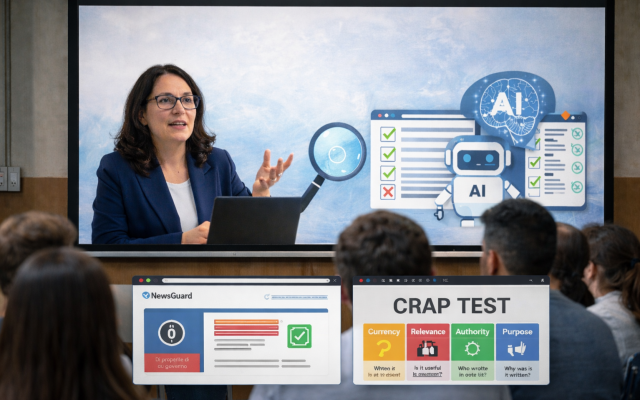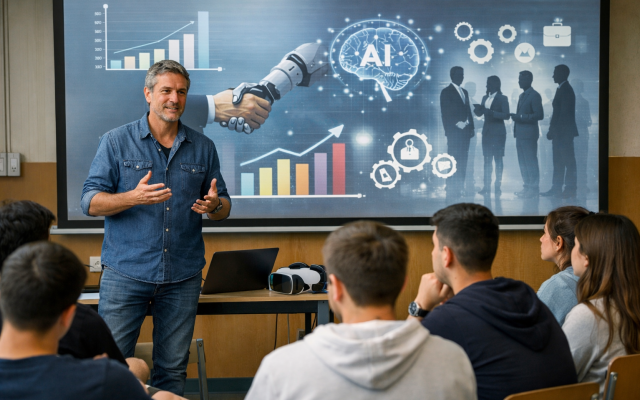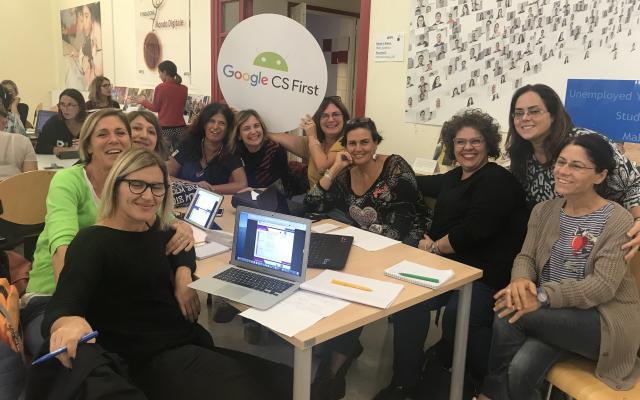CS First for didactic innovation: Roberto Raspa’s experience
Roberto Raspa is an engineer, who is passionate about technology and has been involved in didactic lab activities for years, as an external expert for many schools in educational projects on digital tools and coding, but he is also, and above all, a secondary school teacher. “I served as a robotics expert for INDIRE’s 20 national best practices for the production of multimedia supports for educational robotics,” he explains. “With IdeAttivaMente, an Umbrian start-up that deals with digital educational innovation, I participated in national events on school and digital tools. I am a teaching coach for all school levels and actively collaborate with local and national organisations. In addition to producing numerous projects, I have had the pleasure of publishing “Tamers of Coding,” a concrete handbook that helps teachers enter the fantastic world of educational robotics.” Onelia Onorati has interviewed him as a coach for Project CS First.
What was your first impact with the CS First platform?
I discovered the CS First platform way back in 2019, almost by chance, when I was looking for a way to guide my students through logic exercises that also used the rudiments of coding. I chose it because I immediately understood its potential to guide the weakest students, step by step, through concrete projects, as well as allowing those who could dare more to be free to create their own personalized projects. Furthermore, the control panel allows one to monitor the progress of students, both in labs and remotely.
Five years have passed, what are the strengths of the platform that you have discovered through use of the platform and in your training sessions?
I still think that the platform was truly a fantastic intuition that brought together Scratch, a one-of-a-kind methodology, with a portal capable of guaranteeing classroom management and teaching in general. These aspects make it a project with a high added value that simplifies organizational activities, allowing both teachers and students to concentrate on developing projects, using coding as a resource. Allowing teachers to access individual projects, see, modify, comment, and project them to the class is a truly useful way of streamlining such a process while keeping attention on the didactic aspects.
What is the platform’s contribution to teaching and what attitudes does it encourage in students?
“Project CS First project and its architecture are truly highly inclusive. They allow logical, creative, and stimulating activities to be carried out both individually and in small groups. The extreme flexibility of the platform and its contents allow it to be adapted to all subjects, thus also guaranteeing cross-curricular and interdisciplinary projects. All this while ensuring that students can use digital tools in an active and proactive way, to develop projects, solve small problems, and find the best solutions to any problem. A process, therefore, which also allows one to reinforce skills in terms of digital citizenship and which employs tablets and personal computers not just as tools to passively enjoy content but as useful tools for the teaching process.”
What has struck you most in these years as a CS First coach?
In recent training courses, I consider it relevant to see how, more and more often, teachers of all subjects participate in this type of training. It wasn't like that at the beginning. This means schools are truly being renewed. Teachers are looking for new stimuli and notwithstanding all the organizational and bureaucratic difficulties involved. It’s a stimulating approach that I always try to support by creating training courses with the widest possible applications to make everyone feel involved. I really hope that the logic of project work together with the high-sounding names of methodologies such as Project Based Learning and similar ones, which are ever present in manuals and texts of good practices, become a concrete way of working in schools and not just on a theoretical level. This presupposes a new all-round approach: new tools also imply new ways of working, new ways of relating to colleagues, new ways of planning educational activities, new ways of "doing" school.... it's difficult to expect different results without changing anything (to quote Einstein). So let's let ourselves go, let's take risks, let's challenge problems, let's not stop just thinking that it's difficult ... in the end a solution always arises. Happy experimentation everyone!”




